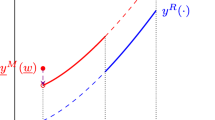Summary
This paper deals with a geometrical optimization that is motivated by locational conflicts [cf.Ostmann; Richter, 1978;Rosenmüller, 1979].
Such location conflicts deserve interest in the theory of committee decisions, and more generally in the theory of collective choice, in game theory and the theory of experimental games, but also in public goods theory (cf. references below).
This paper focuses on two solution concepts for locational conflicts which may be attributed toRawls [1971] andKolm [1972].
The analysis of these solutions will make the body of the paper. We shall derive statements concerning continuity and single-valuedness of the “maximizers”.
Problems and results will be illustrated by a detailed discussion of the subset of all locational conflicts involving at most three persons.
This paper heavily relies on the fact that the optimization allows a straight-forward geometric interpretation.
Zusammenfassung
Der folgende Artikel handelt von geometrischer Optimierung. Die Optimierungsaufgaben stammen aus der Behandlung von Standortkonflikten [vgl.Ostmann; Richter, 1978;Rosenmüller, 1979] in verschiedenen theoretischen Rahmen (etwa: Theorien kollektiver Entscheidungen, Spieltheorie, experimentelle Spiele, aber auch: Theorie der öffentlichen Güter, vgl. Literaturhinweise).
Im Mittelpunkt stehen zwei Lösungskonzepte, die aufRawls [1971] undKolm [1972] zurückgehen. Für Standortkonflikte werden die entsprechenden Optimierungsaufgaben aufgestellt und Aussagen über Stetigkeit und Einwertigkeit der Optimierer abgeleitet.
Die zentralen Fragestellungen, Konstruktionen und Ergebnisse werden ausführlicher am Beispiel der 3-Personen-Standortkonflikte studiert.
Wesentlich für die Methodik dieses Artikels ist die Möglichkeit, die Optimierungsaufgaben in kanonischer Weise geometrisch zu interpretieren.
Similar content being viewed by others
References
Arrow, K.J.: Some ordinalist-utilitarian notes on Rawls's theory of Justice. Journal of Philosophy70, 1973, 245–263.
Behringer, F.A.: Lexicographic Quasiconcave Multiobjective Programming. ZOR ser. A21, 1977, 103–116.
Fiorina, M.P., andC.R. Plott: Committee Decision under Majority Rule: An Experimental Study. Am. Pol. Sc. Rev.72, 1978.
Groenda, H.: Die Bedeutung von J. Rawls theory of Justice für die Wirtschaftswissenschaft. Univ. Tübingen, Ap. 1976, unpublished.
Hildenbrand: Core and Equilibrium of a large Economy. Princeton, N.J., 1974.
Kolm, S.-Ch.: Justice et Equité. Paris CNRS, 1972.
McKelvey, R.D., P.C. Ordeshook andD. Winer: The Competitive Solution... Am. Pol. Sc. Rev.72, 1978.
McKelvey, R.D., andR.E. Wendell: Voting equilibria in Multidimensional Choice Spaces. MOR1, 1976, 144–158.
Ostmann, A.: Fair Play and Standortparadigma. Diss. Inst. Stcs. and Math'l. Ec., Karlsruhe 1978.
Ostmann, A., andM. Straub: On the Geometry behind the fairness Concepts... Working Paper 88, IMW, University of Bielefeld, 1979.
Rawls, J.: Theory of Justice. Cambridge, Mass., 1971.
Richter, W.: A Game-theoretic Approach to Location-Allocation Conflicts. Working Paper 30/78, Inst. Stcs. and Math'l. Ec., Karlsruhe 1978.
-: Shapley's Value and fair Solutions of Location Conflicts. Game Theory and Related Topics. Ed. by Moeschlin/Pallaschke. Amsterdam 1979.
Rosenmüller, J.: On Values, Location Conflicts and Public Goods. Working Paper 86, IMW, Univ. of Bielefeld, 1979.
-: Values of Non-Sidepayment Games and their Application in the Theory of Public Goods. Working Paper 93, IMW, Univ. of Bielefeld, 1980.
Sen, A.: Collective Choice & Social Welfare. S.F., 1970.
Shenoy, P.P.: Pareto Efficiency, Egalitarianism, and the Difference Principle in Rawls' theory of Justice. 2nd Semion Game Theory and Math. Ec. Hagen-Bonn 1980, to appear.
Zeckhauser, R.J.: Determining the Qualities of a Public Good... W. Econ.11, 1973, 39–60.
Zeckhauser, R.J., andM.C. Weinstein: The Topology of Pareto-Optimal Regions with Public Goods. Econometrica42, 1974, 643–666.
Author information
Authors and Affiliations
Rights and permissions
About this article
Cite this article
Ostmann, A. Fair solutions for locational conflicts. Zeitschrift für Operations Research 26, 87–103 (1982). https://doi.org/10.1007/BF01917101
Received:
Revised:
Issue Date:
DOI: https://doi.org/10.1007/BF01917101




